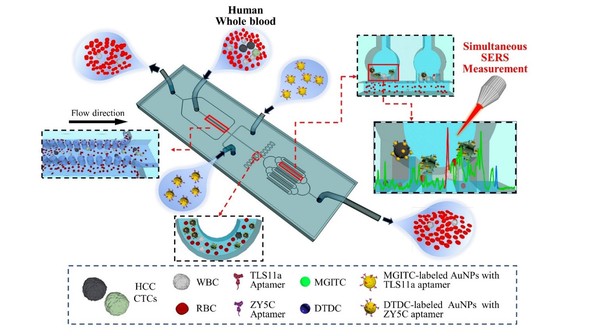Recently, the research team of Professor Yu Liandong of the Precision Measurement and Intelligent Sensing Technology Laboratory of the School of Control Science and Engineering has made important progress in the field of microfluidic chip sensing technology. The relevant research papers have been published in the international authoritative journal Lab on a Chip Published on. The paper was completed by our school in cooperation with Hefei University of Technology and the Second People's Hospital of Anhui Province. Professor Yu Liandong and Professor Gao Rongke are the corresponding authors.
Lab on a Chip was founded by the Royal Society of Chemistry. It is a top journal in the research fields of microfluid mechanics and microdevices. It has an impact factor of 6.799 in 2021 and is a TOP journal in the first district of the Chinese Academy of Sciences.

Circulating tumor cells (CTCs) have become one of the most meaningful biomarkers of liquid biopsy, which are used to evaluate cancer metastasis, recurrence, treatment effect and prognosis. Therefore, the high-efficiency capture of CTCs is considered to be an important cutting-edge technology for malignant tumor diagnosis and formulation of treatment strategies. In recent years, there have been many reports on the selective separation of high-purity CTCs from human peripheral blood samples. These methods can be divided into two categories: i) separation based on the physical characteristics of cells, such as microfiltration, centrifugation, or electrophoresis; ii) Separation based on biological affinity, such as the binding of specific antibodies, aptamers, and magnetic beads. Some of these methods have limitations in the time and complexity of the subsequent analysis of CTCs. In order to be able to study vital information such as material composition and cell morphology in cells under the premise of high-efficiency capture of CTCs, single-cell analysis technology has become particularly important.
Professor Yu Liandong’s research team proposed a surface-enhanced Raman (SERS)-microfluidic chip system based on multivalent aptamer recognition technology to efficiently capture CTCs and analyze heterogeneous phenotypes in situ at the single-cell level . Among them, the specially designed microchannel contains three functional units: separation, capture and in-situ analysis units. By optimizing the experimental conditions, the average capture efficiency of the chip reached 84%, and the purity of the collected CTCs was as high as 95%, indicating that the system can efficiently capture liver cancer CTCs from clinical whole blood samples. At the same time, clever use of the fingerprint feature of SERS to accurately assess the expression of multiple biomarkers on CTCs captured in clinical specimens to achieve cell heterogeneity analysis, which is useful for early screening and metastasis of liver cancer And prognostic evaluation is of great significance.
The research was funded by the National Natural Science Foundation of China and the Shandong Provincial Natural Science Foundation of China.
